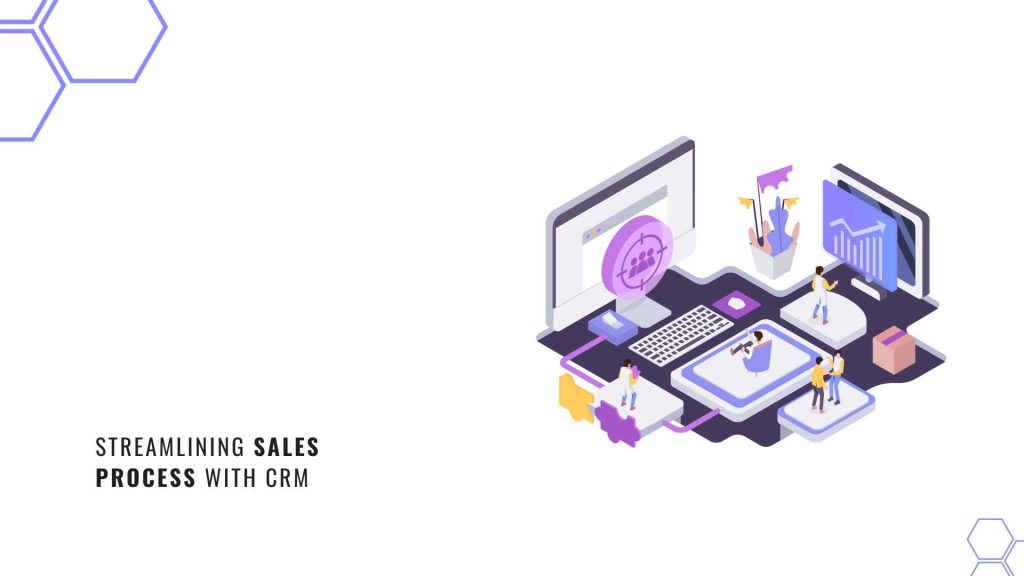Integrating Customer Relationship Management (CRM) software has revolutionized how businesses approach their sales processes in the ever-evolving sales landscape. A well-designed CRM system streamlines operations and is the backbone of a successful sales strategy.
Crafting a winning sales process using CRM software involves a strategic blend of technology, methodology, and human touch, fostering a symbiotic relationship between data-driven insights and personalized customer engagement.
Challenges in the sales process
- Lead Qualification: Identifying high-quality leads amid a pool of prospects, ensuring optimal resource allocation and targeting.
- Data Management: Maintaining accurate and updated customer information across various platforms for informed decision-making.
- Sales Rep Productivity: Balancing administrative tasks and client interactions to maximize the efficiency of sales teams.
- Pipeline Visibility: Gaining clear insights into the sales pipeline to forecast accurately and allocate resources effectively.
- Adapting to Technological Changes: Embracing and integrating new technologies seamlessly into existing processes without disruption.
- Customer Engagement: Nurturing meaningful relationships while scaling sales to meet customer needs and preferences.
Understanding the Foundation: CRM Software
CRM software is the central hub for storing, organizing, and managing customer data. It empowers sales teams by providing a 360-degree view of customer interactions, enabling them to effectively tailor their approach and nurture relationships. Selecting the right CRM system aligned with your business goals and objectives is pivotal to laying a robust foundation for an endearing sales process.
Defining the Sales Process
A structured sales process acts as a roadmap guiding sales representatives through every stage of the customer journey. Leveraging CRM software, businesses can delineate clear milestones, from lead generation to conversion and beyond. Each step can be customized and optimized based on historical data, allowing continuous refinement and improvement.
Integration of CRM into Sales Strategy
Integrating CRM software seamlessly into the sales strategy involves aligning technology with human expertise. Sales teams harness the power of CRM tools to automate routine tasks, prioritize leads, and track interactions. However, the human touch remains indispensable; leveraging CRM insights, sales professionals can personalize interactions, addressing prospects’ and clients’ specific needs and pain points.
Leveraging Data for Informed Decision-Making
CRM software is a goldmine of data, offering valuable insights into customer behaviors, preferences, and trends. By analyzing this data, companies can make informed decisions, refine their strategies, and forecast future sales trends. Predictive analytics within CRM platforms helps identify potential leads and optimize sales pipelines.
Continuous Adaptation and Improvement
A sales process is not static; it evolves with market trends, customer preferences, and technological advancements. CRM software facilitates agility by enabling continuous adaptation and improvement. Regular analysis of sales metrics, feedback from the field, and customer responses empowers businesses to fine-tune their sales processes, ensuring relevance and effectiveness.
Conclusion
In today’s competitive market, leveraging CRM software isn’t just about managing data; it’s about orchestrating a dynamic sales process that aligns technology, strategy, and personalized engagement. Integrating CRM tools enables businesses to drive efficiency, harness invaluable insights, and pivot with agility.
By blending technological prowess with human finesse, companies can craft a winning sales process that enhances productivity and fosters enduring customer relationships, propelling them toward sustained success in the ever-evolving sales landscape.

Vijay comes with a vast experience in ERP and enterprise solutions space with about 20 years of experience in various packaged application like Acumatica, SAP, Orion, Salesforce.com, SugarCRM and, SalesLogix.

